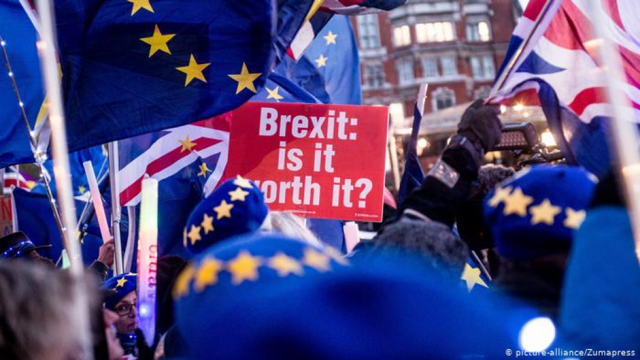The UK election on 12th December 2019 handed a decisive win to the Conservative Party with a majority of 80 seats. Whilst some predicted a hung parliament and more wrangling over Brexit, the win has broken the parliamentary deadlock that the UK has faced since the referendum in 2016.
Many small businesses say they have been harmed by the apparently endless uncertainty over Brexit, so, whatever your politics, there is a sense of relief in the country being able to move forward, albeit one that could be replaced with fears of a cliff edge Brexit in December.
Now that the dust is beginning to settle, UK business owners are asking: what does a Conservative majority mean for my business?
Is it really the end of the Brexit uncertainty?
Brexit uncertainty has weighed heavily on the UK economy since the EU referendum in 2016, with business investment dropping as executives voiced concerns over the potential of a no-deal Brexit that would have seen the UK crash out of the EU without a withdrawal agreement. A strong Conservative majority has meant that the government has already voted to go ahead with leaving the European Union as planned on January 31st.
This clarity appears to have already given the economy a boost. In their monthly survey, financial information firm HIS Markit found that the services sector stabilised in December as orders picked up and optimism rose to its highest level in 15 months. This looks like a widely positive sign as the services sector accounts for 80% of the UK economy.
However, whilst business confidence may be shored up in the short term, the UK could still be facing worrying times ahead. The Conservative manifesto was very clear that there is no intention of extending the transition period beyond December 2020, with Boris Johnson insisting the necessary trade deals and customs arrangements will be ironed out in time.
With no room for manoeuvre, the UK once again faces a cliff edge no-deal Brexit, entirely because of this self defeating lack of flexibility from this newly elected Government. Consensus amongst most businesses, business groups and experts is still unequivocal in its prediction that leaving without a deal will be very damaging for many UK businesses, in both the short and long term. The Society of Motor Manufacturers and Traders said that Britain leaving the EU under WTO rules could lead to UK car production falling by more than a third with £40bn in lost production by 2024.
Business rates are set to be reviewed
‘We will cut the burden of tax on business by reducing business rates. This will be done via a fundamental review of the system.’
– Conservative Manifesto 2019
The Conservative manifesto, quoted above, outlined plans to change the business rates system in order to help the UK’s high streets thrive once more. The Conservatives have promised to increase the business rates discount available to businesses with a rateable value below £31,000 from 33% to 50% in 2020-21, an overall reduction of £320 million. The plan will also be extended to ‘grassroots music venues, small cinemas and pubs’. However, the discount is set to last for just one year, which won’t be much help to struggling businesses in the long term.
Some UK business owners don’t think the government is doing enough to help. Anthony Smith, chief executive of retailer Shoe Zone, said: “We need a change in the rates system because the current cost of rates is too much for retailers, particularly in small towns. Current rates don’t reflect the market. All we want to see are rates which are aligned with the current rental property market.”
Other business leaders are sceptical that these promises will even materialise after the Conservatives failed to act on previous promises of reform. The last review of business rates was completed just three years ago and resulted in relatively minor changes. Jerry Schurder, head of business rates at property consultancy Gerald Eve, was quoted as saying the review was “just another way of kicking the problem into the long grass”. Business owners will have to wait and see whether these promises actually turn into policy.
New off-payroll working rules will be reviewed
New off-payroll working rules were set to begin in April 2020, which meant that larger clients would become responsible for determining the IR35 status of smaller contractors (for more detail, take a look at our Guide to the new IR35 Legislation Changes). However, HMRC’s interpretation of the rules has been disputed and there have been calls for the introduction of the legislation to be delayed. The Conservatives didn’t mention IR35 in their manifesto but have now committed to reviewing the rules after the Liberal Democrats and Labour both said they would if they were elected.
Chris Bryce, CEO of IPSE, said: “To truly support the self-employed this government must also halt the changes, which are due in April, whilst a full review is carried out. Time is short: the new Conservative government must act now to protect this vital sector.”
Restoring confidence for small businesses
The Conservatives say they ‘know businesses are at the heart of a successful economy’ and will support them with ‘lower taxes, better infrastructure and… new post-Brexit free trade deals’. However, an uncertain few years has led to a lack of confidence within the business community, and small business owners will be keen to see whether promises designed to help them actually turn into real policies.
Mike Cherry, chairman of the Federation of Small Businesses, said: “The restoration of small business confidence and trust in politics rests on seeing the Conservatives’ pledges to us swiftly enshrined in a programme for government. It’s now time to turn kind words on bread and butter issues facing the small business community into tangible action.”
Though it seems that a Conservative majority means the restoration of certainty and confidence for small businesses in the short term, with so much hanging in the balance in terms of post-Brexit trade deals, it’s impossible to say whether that will translate into continued economic growth in the long term. It seems that small business owners aren’t out of the woods yet, despite what Boris Johnson might want you to believe.













